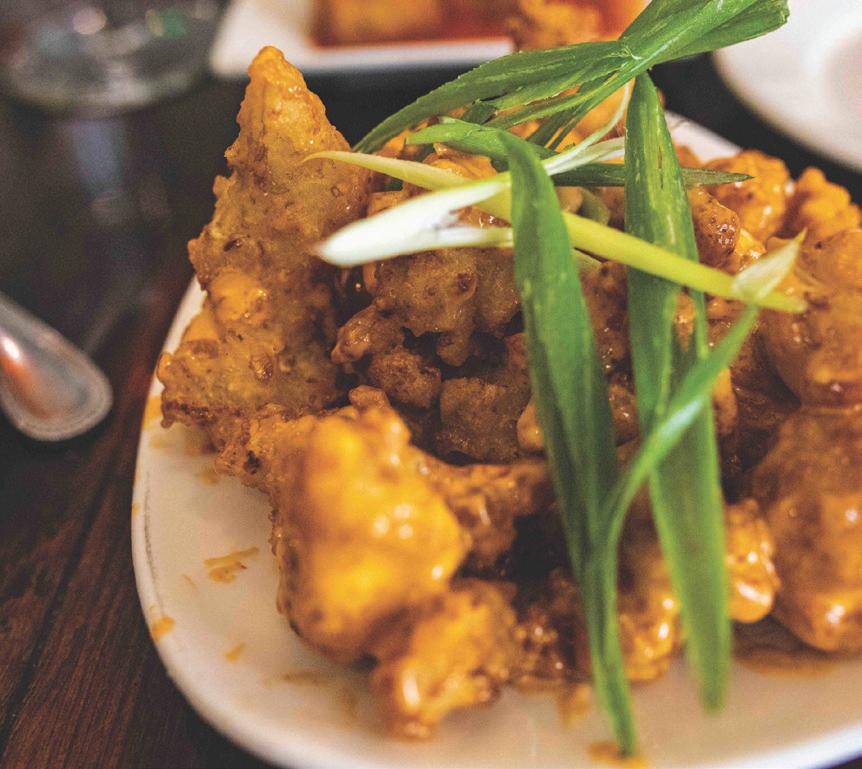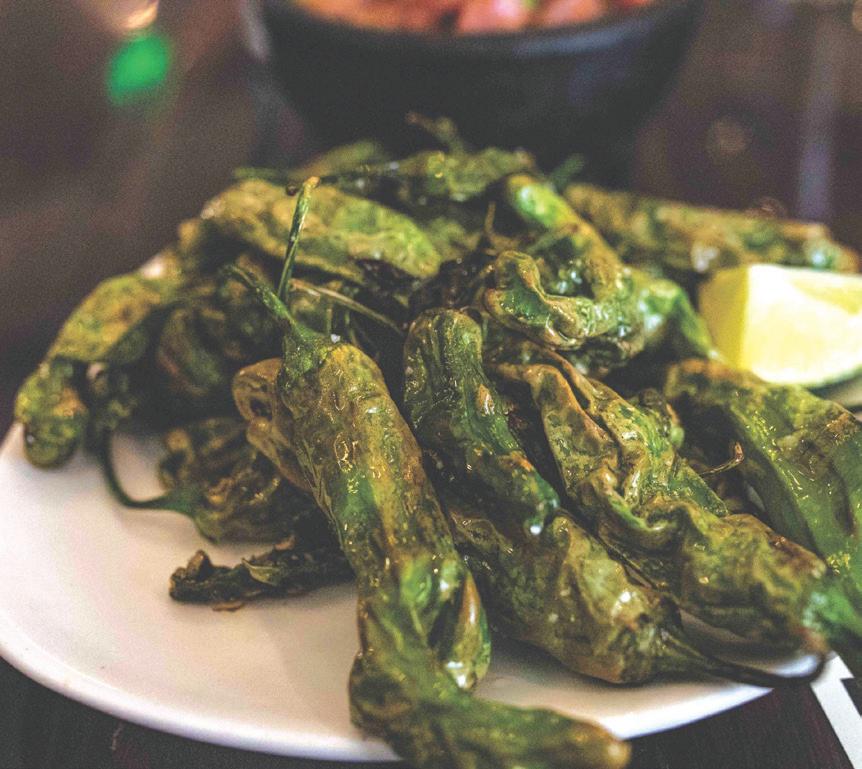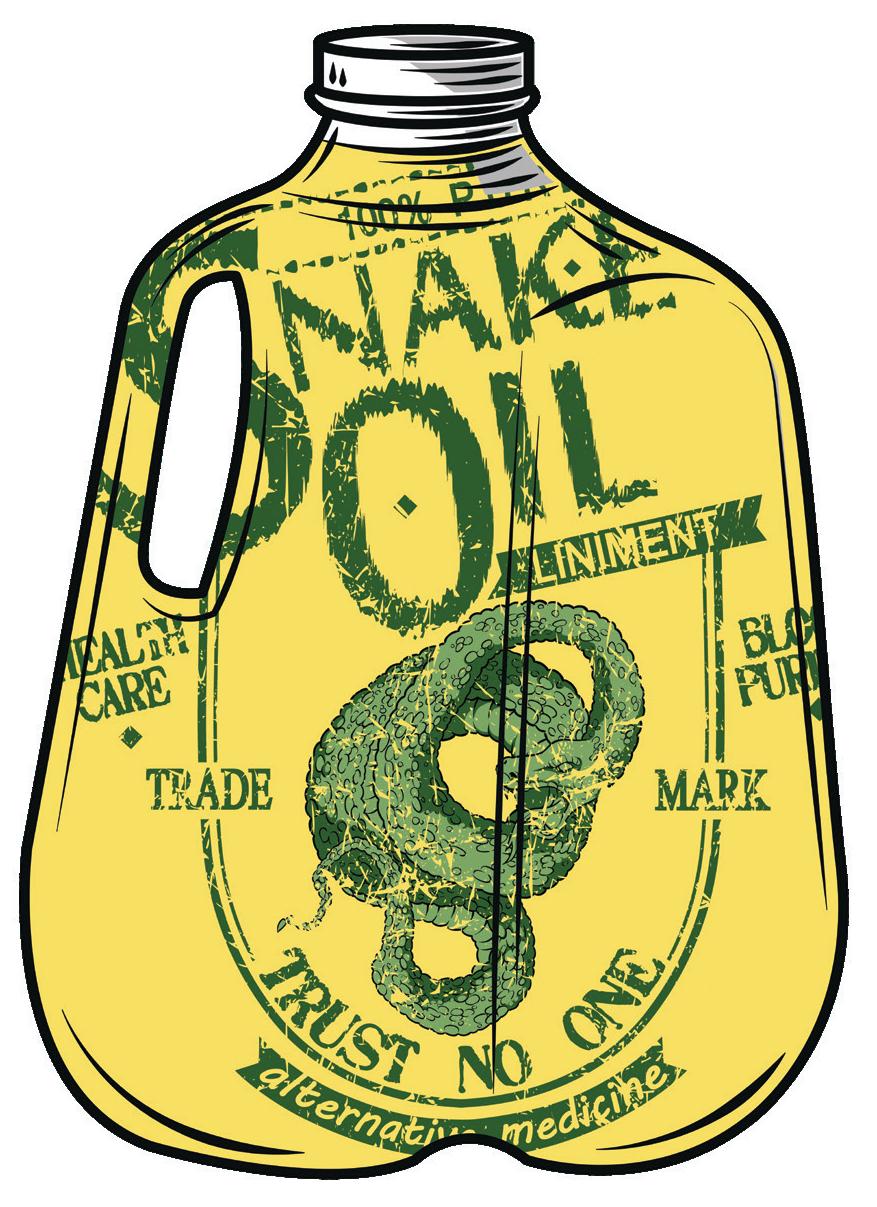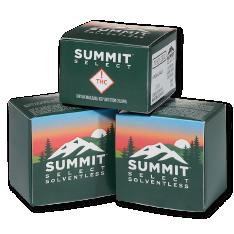
7 minute read
Cuisine: The Roost’s sizzling shishitos and more
by John Lehndorff
The Roost’s sizzling shishitos and bangin’ caulifower make happy hour even happier
Advertisement

MATT MAENPAA


Imight be in a better mood if I went out for happy hour more often. That’s my big fnding from some recent research in Longmont. Like a lot of folks, I forgot about happy hour when the pandemic arrived and hadn’t been back. When I joined Boulder Weekly drink columnist Matt Maenpaa for mid-week happy hour at The Roost, I remembered why I loved it: affordable drinks and big-favored small plates. We split crispy polenta bites with chevre, smoked tomato puree and Balsamic syrup. The ahi poke bowl was good, but the “a-ha” tastes were two near-perfect and very simple appetizers. Bangin’ caulifower cloaks fried forets in a thin, crispy coating that holds the temperature and serves as a vehicle for a spicy dipping sauce. Best of all were the blistered shishitos. Flash-fried and simply dished with salt and lime juice, the mildly hot chilies made me want to have another cocktail.
Boulder Recipe Flashback: Marie’s Famous Chicken
Marie’s Cafe in North Boulder dished homestyle breakfast and lunch for 34 years and was known for its Czech kolacek pastries and crispy schnitzel. This recipe was published in a spiral-bound community cookbook, The Best of Boulder II, compiled in 1979 by the Boulder Community Hospital Auxiliary.
Marie’s Cafe Chicken Paprikash
1 chicken in pieces (3 to 4 pounds) 1 large yellow onion, peeled and chopped 1/2 cup chopped bacon 1/4 Cup butter 1/2 tablespoon Hungarian paprika 1 1/2 cups chicken broth
2 tablespoons four 3/4 cup sour cream 1/2 teaspoon salt Cut chicken in small pieces (or buy chicken wings, breast, thighs, etc.) put in a deep saucepan, cook onion and bacon in butter, stirring over medium heat for a few minutes. Add chicken, salt and paprika. Brown the chicken, turning pieces occasionally for about 10 minutes. Add broth, cover pan, lower heat to simmer and cook for about 45 minutes. Remove chicken from pan when tender and set aside. Sprinkle four in pan liquid and combine before stirring in sour cream. Add chicken and simmer fve minutes. Serve with egg noodles or bread dumplings. Optional: Add a cup of roasted green chilies, chopped or pureed, right after the sour cream. After writing about golf food for several years I’ve learned two things. Most golfers admit that the food served at many Colorado clubs, public and private, tends to be sub-par. There are also notable exceptions that aren’t at members-only places such as TPC Colorado. The PGA course in Berthoud boasts the longest hole at any U.S. professional golf course: The 773-yard, par-5 13th hole. Its huge clubhouse features a lounge and three eateries open to the public. There’s 473, a high-end steakhouse, plus a takeout cafe and the casual Center Stage restaurant where I grabbed lunch recently. Every seat has a sweeping view of the course and the foothills, and the fare is quite good and fairly reasonably priced for golf club fare. I smiled over the freshness of the whole boneless walleye fried in a light ale batter and dished with malt vinegar, tartar sauce and lemon. Center Stage also offers pizzas, steaks, a legit Caesar salad and a juicy prime rib French dip hoagie dished with Provolone, horseradish cream and au jus. It’s worth the drive just for the house tots, a true favor bomb. Crowning crispy hot spud-lets are house-smoked pulled pork, sriracha aioli, cotija cheese and chimichurri sauce.
Culinary calendar: Fall Food Fun
The Lafayette Brew Fest is Sept. 10, pouring beverages from Cellar West, Liquid Mechanics, Mother Tucker, Westbound & Down, Odd13, Front Range Brewing and others (lafayettecolorado. com) … Sunbeam Farm on Cherryvale Road hosts farm dinners Sept. 10 and 24 with chef Juliette Wells (info@sunbeamfarm.com) … Longmont Restaurant Week (Oct. 7-16) kicks off Sept. 29 with a farm-to-table dinner at Boulder County Fairgrounds (longmontrestaurantweek. com).
Email: nibbles@boulderweekly.com
Weeding out deceit
There is a fne line to walk in the CBD industry, between marketing the potential health benefts of a product and overselling it with disingenuous claims. Many companies make honest efforts to accurately promote the effects and uses of their products, using reliable scientifc evidence to support any health-related claims they make—companies like Mary’s Medicinals, Leaf Remedys and Colorado Botanicals.
Then there are companies that are taking advantage of the new and largely unregulated nature of the industry. They use words like “proven” and “cure” and claim that their products are an outright antidote to cancer, heart disease, hypertension, Alzheimer’s disease, bipolar disorder, chronic pain, acne, COVID-19 and more. These companies know they’re making claims that aren’t backed up by science. Even if it’s an objectively good product, the advertising is disingenuous. They’re scamming people. And in some cases, they’re even selling products that don’t have any CBD in them at all, or worse, products that contain dangerous contaminants (see Weed Between the Lines, “Gray market problems,” Aug. 11, 2022).
That’s why, in December of 2020, the Federal Trade Commission (FTC) launched “Operation CBDeciet’’ in an effort to send a message to the Wild West CBD industry. The FTC identifed six cannabis companies, making “deceptive” claims about their products, proposing settlements with each business—fve of which required fnancial remedy, and all of which required respondents to have “methodologically sound human clinical testing before they can make a wide variety of disease-related claims in the future.” The FTC recently fagged a seventh business, prompting an unprecedented and unexpected action from the feds: customer reimbursement.
The six companies originally identifed in Operation CBDeciet were Utah-based Bionatrol Health LLC and Epichouse LLC, California-based CBD Meds Inc. and Reef Industries, Boca Raton-based HempmeCBD, and Colorado-based Steve’s Distributing LLC. According to the FTC, many of these companies made inaccurate claims; that their products were effective alternatives to prescription medications and/or were effective at treating diseases like multiple sclerosis, amyotrophic lateral sclerosis (ALS), osteoporosis, Alzheimer’s disease, Parkinson’s disease, and cancer. Reef Industries’ ads claimed, “CBD hemp oil has a huge range of potential health benefts and uses, including . . . fghting cancer, . . . eliminating depression, [and] preventing infammatory arthritis.” Another ad contended, “If you or someone you love suffers from diabetes, try using CBD oil to treat it. Not only is it safer than the most common diabetes medications, but it’s also more effective.”’
HempmeCBD made up its own fake study (or at least dramatically twisted and infated existing conclusions), claiming, “[I]n a recent study, Israeli research has shown an 80% success rate in reducing problematic behavior in children with Autism using CBD.”
CBD Meds Inc. went a step further, not only making
a study up, but claiming that the research was done by the “United States Federal Government” itself. The fake FTC sends a message to snake-oil CBD companies: federal study allegedly found, “CBD may make chemoit’s coming for you, and it means business therapy more effective and increase cancer cell death without harming normal cells.” by Will Brendza The seventh and most recent target is Arizona-based Kushly and its owner Cody Alt. It’s not technically part of Operation CBDeciet, but it is being similarly challenged for its misleading advertising. The biggest difference with this most recent case is that the FTC is actually reimbursing 576 customers who bought Kushly’s products under the false pretense that it could cure their acne, psoriasis, cancer, multiple sclerosis and other health ailments. The FTC is sending a total of $21,000 to duped customers—equating to roughly $36 per person. “This is the seventh case we’ve brought against CBD sellers who should know better than to make unsupported health claims for their products,” said Daniel Kaufman, acting director of the FTC’s Bureau of Consumer Protection, in a press release. “There may be some benefits of CBD, but there’s no proof that it can treat the serious health conditions in Kushly’s advertising, such as Parkinson’s, multiple sclerosis or cancer.” Kaufman’s right on both accounts: CBD isn’t a cure-all for neurodegenerative diseases, or an antidote to cancer, but it can help reduce anxiety, help treat sleeplessness, help control pain and infammation, and it can help lower cravings for addictive substances. There is scientifc research to back all of those effects up, according to Harvard Medical School. Operation CBDeciet and the subsequent case of Kushly won’t just take a few falsely advertised products off the shelves. These actions send a message to all CBD producers and businesses out there: The FTC means business. It isn’t going to allow people to continue making snake-oil sales of CBD just because the industry is in its infancy. According to Vantage Market Research, the CBD industry is projected to be worth $47.22 billion by 2028. That’s serious money. Which will undoubtedly elicit more serious regulation as the industry matures and proliferates.

Email: will.brendza@gmail.com







